Earlier this week, Argentina hosted the 53rd International Math Olympiad (IMO), a mathematical problem-solving contest for high school students from all over the world. That means it’s almost time for another “mini-polymath” project!
Edit: As of Friday morning (7/13/2012), the problem still has not been completely solved, so there’s time to chime in on the discussion thread!
For the past few years, mathematician Terry Tao has hosted and coordinated a social problem-solving event, where people around the world use a blog and wiki to work together on one of that year’s IMO problems. His 2009 post is a good introduction to the event and the spirit behind it. Personally, I had a blast trying to contribute (if only a tiny bit) to the 2010 event.

Tao will be hosting a fourth “mini-polymath” tonight (July 12, 2012), starting at UTC 22:00, which is 6pm EST for us here on the US East Coast. If you read blogs like mine, I imagine you’d enjoy participating, or at least following along and watching the mathematical ideas going off like fireworks 🙂
I believe that all of this was inspired by Timothy Gowers’ original post on polymath projects: finding a way for many individuals, making one trivial observation at a time, to contribute to the solution of a substantive mathematical problem. Of course the IMO-problem-based mini-polymaths are just something for fun, a social event for working problems that have already been solved. (I’d love to organize something like this for the International Linguistics Olympiad (ILO) as well!) But the polymath wiki shows a few longer polymath projects that have actually led to solving novel problems and even publication of the results.
My alma mater, Olin College, is an engineering school that explicitly focuses on collaboration and teamwork, and I’ve missed that spirit in some of my work environments since then… so I love taking part in these polymaths and related events like hackathons or DataKind’s datadives. I’d like to organize some kind of polymath/hackathon/datadive for a big statistics conference such as JSM. Statisticians have the tools to tackle a wide range of potential problems: I can imagine teams for proving a mathematical result, analyzing and visualizing a real dataset, coding a new technique into an R package, or brainstorming a new approach to stats education.
Any takers?
